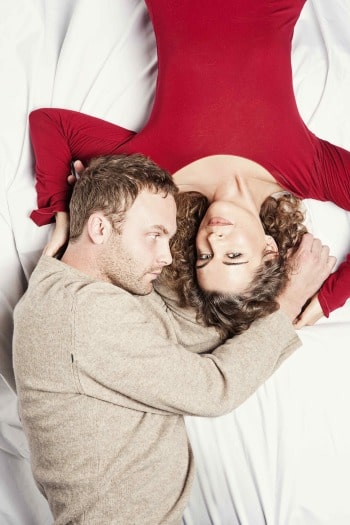Europe – Reginald Theatre, Seymour Centre
Europe, Michael Gow’s 1987 play about Australia’s defensive stubbornness about its national youth, as represented in the body of a guy called Douglas (Andrew Henry) is currently being revived as part of the Reginald season at Sydney’s Seymour Centre.

Douglas is obsessed with Barbara (Pippa Grandison), a European actress from an undisclosed country. After a brief fling once while she was performing in Australia, he has come to her country to find her again. He’s obsessed. She… is not.
Douglas is Australia and Barbara is Europe (of course) in this cultural allegory writ large; Douglas wants to drown himself in Barbara and her culture and history; Barbara thinks Douglas has no grasp of culture and history because his country is immature and so is he. Nothing can be real between them, she thinks, because they’re coming from completely uneven places. Cue the inferiority complex.
Of course, they are both immature: Barbara is impossible, an actress with all the trappings; Douglas is lovestruck, naïve, and a little disturbingly unable to leave a woman’s space no matter how much she tries to get him out of it.
Grandison plays large as Barbara – with gestures, expression, and an accent that’s not quite perfect – a little too broad for the smaller scenes, but certainly very actress-y. Henry is excellent and plays awkwardness well, a knack for a certain kind of lived-in neurosis that feels like the kind someone is aware of but absolutely cannot change – it is fundamental, and sort of charming, and sort of worrying, but all too human.
Director James Beach has found the humour in the script but often due to uneven pacing the tenderness feels forced and unearned; silences last a little too long without the sharp beat of comedy or discomfort to undercut it and make it satisfying. Some of the looks between Douglas and Barbara are impenetrable and not in a great way.
However, there are some strong, good beats: a brief disco interlude with a statue of Mary slowly pushed onstage to indicate a scene in a chapel; a couple of the dialogue beats move quickly and effortlessly; Henry plays drunkenness well.
As Barbara stars in her unnamed play (in which she shoots herself at the end – one of the classics, she says), at one point, Douglas sits in her dressing room, shades of Hedda Gabler’s Lovborg’s vine leaves in his hair, but he – they – fail to make anything beautiful. Their cultures, their natures, are right now too incompatible, and too obsessed with difference to make something that works.
No one can be happy when they’re defensive. No one dies at the end, but no one gets what they want, either – and won’t, no matter how long Douglas waits for Barbara to accept him; no matter how long we wait for validation, it can’t come from anyone but ourselves.

